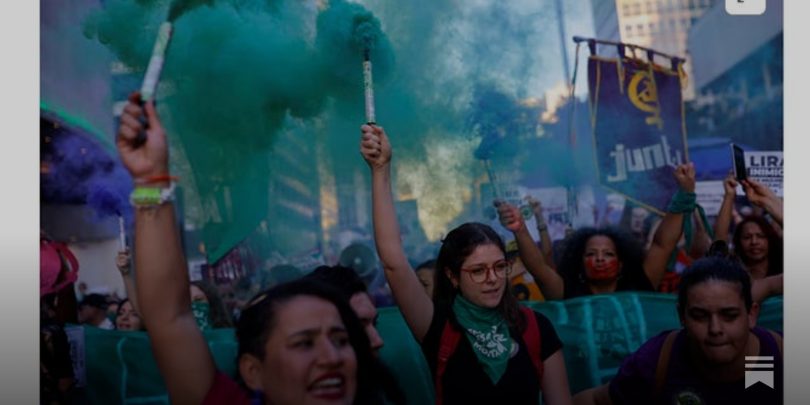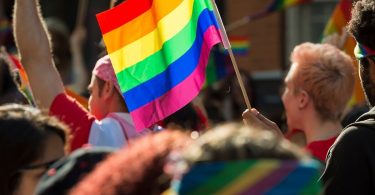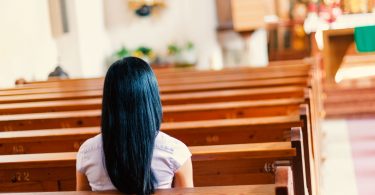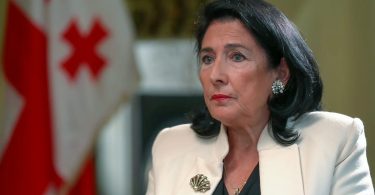Curated by FG Contributor Samiha Hossain
Sao Paulo, June 15, 2024. REUTERS/Amanda Perobelli
In Brazil, thousands of demonstrators took to the streets of Sao Paulo last weekend as protests sweep across the country in opposition to a bill that would further criminalize abortion by equating it with homicide. The bill, proposed by conservative lawmakers and heading for a vote in the lower house, would also apply in cases of rape. Critics say those who seek an abortion so late are mostly child rape victims, as their pregnancies tend to be detected later.
To rally opposition, rights’ groups created the ‘A child is not a mother’ campaign that has flooded social media. Placards, stickers and banners emblazoned with the slogan have abounded during demonstrations. And viral visuals depicting women in red cloaks compare Brazil to Gilead, the theocratic patriarchy Margaret Atwood created in her dystopian novel, “The Handmaid’s Tale.” About 10,000 people, mostly women, filled several blocks of Sao Paulo’s main boulevard on Saturday afternoon, organizers estimated. Many also wore green clothes and scarves, a common sight in women’s rights mobilizations across Latin America.
Marli Gavioli, 65, has mostly refrained from protesting since demonstrations in the 1980s that called for the end of the military dictatorship, but she told The Associated Press she’s too outraged to remain home.
I couldn’t stay out of this, or I would regret it too much. We are being whipped from all sides, us women. It’s past time we do something. -Marli Gavioli, 65, demonstrator
Brazil only permits abortion in cases of rape if there is an evident risk to the mother’s life or if the fetus has no functioning brain. Aside from those exceptions, Brazil’s penal code imposes between one and three years jail time for women who end a pregnancy. If the bill becomes law, the sentence would rise to between six and 20 years when an abortion is performed after 22 weeks. Critics have highlighted that would mean convicted rapists could receive lesser sentences than their victims.
Experts say that late access to abortion reflects inequalities in health care. Children, poor women, Black women and those living in rural areas are particularly at risk. Among the protesters in downtown Rio last Thursday was Graziela Souza, a 25-year-old student who was sexually assaulted as a child.
I think it’s very important for victims to be present, as much as it hurts. We must speak out and fight against it, because if we stay at home we are going to lose. -Graziela Souza
Human rights lawyer and activist Rauda Morcos. Photograph: Rauda Morcos
Queer Palestinians offer insight into “pinkwashing”. Last November, Israel’s government posted two images from Gaza on its social media account. One shows Israeli soldier Yoav Atzmoni, in battle fatigues, in front of buildings reduced to rubble by Israeli airstrikes. He holds a rainbow flag with a hand-scrawled message: “In the name of love”. In the second he poses beside a tank, grinning as he displays an Israeli flag with rainbow borders. “The first ever Pride flag raised in Gaza,” the caption for both images reads. At the time, Israeli attacks had killed more than 10,000 Palestinians in Gaza, including more than 4,000 children, according to Gazan health ministry figures. The toll has now risen to over 37,000, and more than a million people are on the brink of famine.
Daoud is a veteran queer activist and a Palestinian citizen of Israel whose name has been changed. He asked for anonymity because Palestinians have faced arrest and persecution for expressing solidarity with civilians in Gaza and criticising the State of Israel.
That cognitive disconnect of seeing what else is in the image – rubble that was people’s homes – then seeing the flag being displayed in a celebratory way. It is a massive violation to people who have fought for their rights under this flag. -Daoud
Those images from Gaza are part of a long-running international campaign that critics call “pinkwashing”because they say it aims to bolster the Israeli state by linking it with queerness, presenting it as an explicit counterpart to a Palestinian identity depicted as exclusively and violently homophobic. It exploits global support for LGBTQ+ rights to further an Israeli ultranationalist political agenda and legitimise the oppression of Palestinians, said Sa’ed Atshan, chair of the department of peace and conflict studies at Swarthmore College and author of Queer Palestine and the Empire of Critique.
When Rauda Morcos, a Palestinian citizen of Israel who is a human rights lawyer and award-winning activist, heard that Tel Aviv planned to mark Pride this year, she was stunned. Morcos says she was taken back nearly two decades to 2006. That year there was an Israeli attack on Gaza, and as head of a Palestinian queer activist group she campaigned for a boycott of the WorldPride parade hosted by Jerusalem Open House.
What wrong timing, what bad timing. Not only then but now. In fact, it’s always the wrong time and it’s always the wrong topic, because ‘there is no pride in occupation’, whether it is 2006 or now. -Rauda Morcos
The idea that Israel serves as a regional haven for the queer community feels particularly cruel and hypocritical, activists and academics said, at a time when the LGBTQ+ population of Gaza has no more refuge from Israeli bombs than any other Palestinians. Moreover, there is a long, well-documented record of the Israeli security services exploiting the sexuality of LGBTQ+ Palestinians in the occupied West Bank and Gaza, with devastating and sometimes fatal results.
The Israeli rhetoric just makes it even harder for LGBTQ Palestinians, because it reinforces the idea that queerness exists nowhere else … It erases the fact that there are Palestinian activists, queer Palestinians. -Phillip Ayoub, professor of international relations at University College London
Migrants from the LGBTQ community at an ORAM event in Mexico.ORAM
We trans people have a hard time getting hired. It’s horrible. Here you survive if you are a stylist or if you are a prostitute, otherwise not. They don’t give you work. -Ramírez
A new campaign led by the Organization for Refuge, Asylum and Migration, or ORAM, which assists LGBTQ asylum-seekers, has launched a campaign in Mexico to raise money to offer safe shelter, food and transportation for a month to 100 LGBTQ refugees or asylum-seekers in Mexico City. Activist and a member of the ORAM board, Enrique Torre Molina said the idea is to raise 400,000 Mexican pesos (about $21,670) to help 100 migrants for 30 days, through organizations that have physical spaces such as shelters and houses where they receive LGBTQ people, migrants, refugees and asylum-seekers.
In the last three years, Mexico has recorded 231 murders of LGBTQ people: 78 in 2021, 87 in 2022 and 66 in 2023, according to data from Letra S: Sida, Cultura y Vida Cotidiana, a civil organization dedicated to the defense of LGBTQ people, which has recorded such cases since 1998.
We are a community that experiences discrimination and violence. In some cases, LGBT people are in danger precisely because of the rejection of their sexual orientation or gender identity, and this affects migrants or refugees differently. Sometimes it is not that these people decide to migrate but that they are forced to cross an international border, looking for a safe place and freedom. -Enrique Torre Molina
For Dana Graber Ladek, head of mission of the U.N.’s International Organization for Migration, or IOM, an important aspect of LGBTQ migrants who arrive in Mexican territory is the “triple vulnerability” they suffer: their sexual orientation or gender identity; being migrants; and being undocumented in the country. Several researchers, including Graber Ladek, say one of the LGBTQ migrant population’s big problems is the absence of more data and information about them. But for now, ORAM’s campaign to offer shelter and help to LGBTQ migrants in Mexico City continues and has the support of people like Ramírez who experienced firsthand the difficulties of arriving in a big city without knowing anyone.
This project is going to help a lot so that people can find a safe place where they will not be discriminated against and can have a roof over their heads and a plate of food, even if it is for a few days. There are opportunities, but you have to fight for them, and I would not like them to experience everything that I have experienced. -Ramírez
PHOTOGRAPHS BY ASHISH SHAH
Every year in the month of Chaitra (April/May), the sleepy village of Koovagam comes alive, as thousands of trans women, dripping in gold jewels and sweat, gather to become brides for a day and reenact rituals of marriage, sacrifice, and widowhood. The 18-day-long affair is known as the Koovagam festival, a trans-celebratory occasion rooted in mythology and Tamil renditions of the Hindu epic, Mahabharata.
It’s beautiful to see my community in such huge numbers. -Kalki Subramaniam, activist and artist from Pollachi
The trans and queer communities in India have long faced discrimination, especially in more rural and conservative areas, despite the country’s trans community being one of the oldest in the world. Spaces like Koovagam remind the community—as well as outsiders—that not only is a world where queer and trans folks stand together for their liberation possible, it already exists. And it’s staying. But these events are at risk—not just because of violent laws and legislation that fall drastically short of protecting queer and trans people, but also because of the ever-growing threat of the climate crisis. In fact, temperatures at this year’s Koovagam stayed at a boiling 105 degrees Fahrenheit throughout the almost three weeks of festivities.
The festival includes a beauty pageant, condom distribution, HIV/AIDS mobile testing centers, a marriage ceremony, and widow mourning rituals. Nisha Venkat is a South Indian, Dubai-raised podcast producer and activist who organizes events for Satrang, a Los Angeles-based organization serving LGBTQ+ South Asian folks.
This festival is absolutely queer and trans joy, but more than that, it’s queer integration. These women often live on the fringes of society, but Koovagam specifically centers their existence and experiences and allows them to partake in life milestones—many of which are important to some, not important to others, but regardless, to carve out the opportunity to participate in them is beautiful. -Nisha Venkat
Not only is the festival a political statement, but a cultural one as well. Therefore, the visibility of the festival is central to its identity. But trans spaces like Koovagam, which often take place at least partly outdoors, are at risk—as being outside amid India’s sweltering temperatures can result in heat exhaustion, heat stroke, dehydration, and other heat-related illnesses. Rising temperatures and the larger climate crisis endanger vulnerable populations, like trans folks, disproportionately, as those who are already at risk of or currently experiencing homelessness, food insecurity, health injustice, and abuse, are more likely to face the repercussions of extreme weather events.
[Trans women] are mostly silenced in spaces, but at Koovagam, we are gathered together by the thousands. The festival isn’t necessarily a rally, but a collective voice. At its core, Koovagam is where we celebrate our talents and beauty and what we contribute to society. We talk about our future as a community, and why we matter—why trans lives matter. -Kalki Subramaniam
Irish-Egyptian writer and stand-up-comedien Zahra Barri’s debut novel Daughters of the Nile, published earlier this month, explores three generations of Egyptian women. Barri was the winner of Unbound Firsts 2024, an annual competition for writers of colour by the UK-based crowdfunding publishing house. Her prize was the publication of her compelling multi-generational saga about Islam, queerness and feminism set between Egypt and the UK, spanning eight decades.
Daughters of the Nile is Barri’s proclaimed love letter to the strong Muslim Egyptian women she grew up with and the ground-breaking female figures she discovered through the annals of Egyptian history. She also drew inspiration from remarkable – and comical – members of her own family.
I wanted to write against the cliché of the Muslim woman. I’ve grown up with very strong, feminist Muslim women. I wanted to show how history repeats itself in families and represent the Muslim woman in new and interesting ways. I knew I wanted to cover a lot of taboos, as well as explore Islam from a feminist and non-cis hetero perspective. My family was a starting point and then I created this alternative Egyptian family from that and the characters came alive on the page. -Zahra Barri
The book’s title Daughters of the Nile, is an English translation of Bint Al-Nil, the real-life feminist magazine Doria Shafik founded and edited between 1945 and 1957, which the Egyptian government ultimately banned. Barri gives us a behind-the-scenes look into Shafik and her feminist peers’ lives, as they plan a feminist revolution while juggling the familial expectations of their husbands and children who expect them to be home in time to cook and serve dinner.
There’s so much opposition between Western, secular feminists and Muslim feminists and I am an embodiment of both because I’ve had an Islamic upbringing from my Egyptian side and lived in Saudi Arabia, but I’ve also lived in the West. I’ve seen empowered women on both sides and oppressed women on both sides. And as Fatima Mernissi says, we’re all oppressed by the patriarchy in different ways – it’s two sides of the same coin. -Zahra Barri
Samiha Hossain (she/her) is an aspiring urban planner studying at Toronto Metropolitan University. Throughout the years, she has worked in nonprofits with survivors of sexual violence and youth. Samiha firmly believes in the power of connecting with people and listening to their stories to create solidarity and heal as a community. She loves learning about the diverse forms of feminist resistance around the world.







